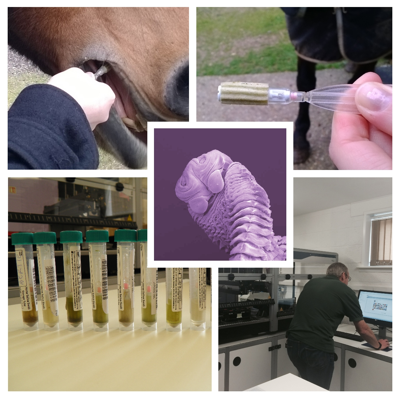Managing tapeworm burdens on livery yards
Dr Corrine Austine from Austin Davis Biologics, the company whose innovative team of experienced scientists developed the EquiSal Tapeworm test explains ...
Tapeworm burdens are a threat to horse health as they are associated with various types of colic and intestinal obstruction. The presence of a tapeworm burden also causes localised chronic inflammation which can lead to lesions in the intestinal wall.
Although tapeworm eggs can sometimes be detected in worm egg counts, this method is unreliable as the eggs are released in specialised packets rather than spread throughout the faeces. Tapeworm burdens are more accurately diagnosed using either a blood or a saliva test, which both detect tapeworm-specific antibodies present in the sample.
What is the EquiSal Tapeworm test?
The EquiSal Tapeworm saliva test has been developed by experienced scientists at Austin Davis Biologics to reliably detect tapeworm burdens. It works like a blood test, but instead, uses saliva that you collect yourself. The test is scientifically proven to diagnose tapeworm burdens with high accuracy, so it tells you if your horse has a burden and whether you need to worm or not.
The scientific validation of EquiSal Tapeworm testing has been published by the peer reviewed journal, Veterinary Clinical Pathology and is endorsed by veterinary consultants at Bransby Horses, who use the test for the 400 horses in their care as part of their worm control strategy. Peer reviewed publication confirms the scientific quality and reliability of the EquiSal Tapeworm test.

Using EquiSal Tapeworm in livery yards
We know now that it is especially important to avoid routine worming strategies as these can cause worms to develop resistance, enabling some of them to survive worming treatments. This leads to a resistant worm population on the pasture and within the horses grazing it. A suitable worm control programme should include regular worm egg counts for redworm and roundworm, together with EquiSal Tapeworm testing every six months. Horses only need to be wormed if testing identifies that the horse has a worm burden. Despite this testing regime however, encysted redworm should always be treated routinely every winter.
More than 18,000 horses have now been tested with EquiSal Tapeworm and only a quarter of these required worming! This level is much lower in well managed yards where on average only 15% of horses will require treating for tapeworm - and many yards have no tapeworm burdens present at all.
Tim Stockdale, leading international showjumper, tests all of his horses every six months using EquiSal Tapeworm testing. He only worms horses at his yard when they are diagnosed with a burden and the last time they were all tested, none required worming! Tim told us; “I take my horses’ welfare very seriously and this professional scientific approach to diagnosing worm burdens is the way forward. For me, using Equisal Tapeworm makes total sense.”
How to test with EquiSal Tapeworm
To test for tapeworm, all you need to do is collect saliva from your horse using the specially designed EquiSal swab and then return it to the lab using the freepost bag included with the test kit. Results are emailed with a worming recommendation.
Test kits are available online at www.equisal.com or through veterinary practices and SQP stockists. Orders of more than 10 kits can be purchased at a discounted price.



